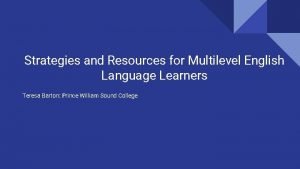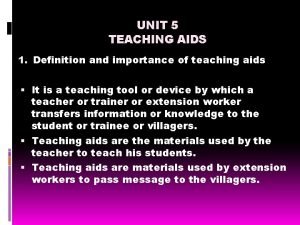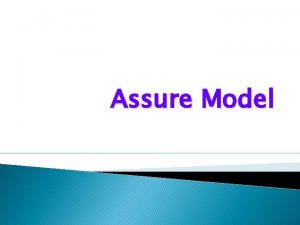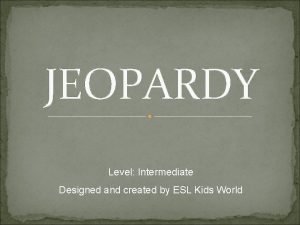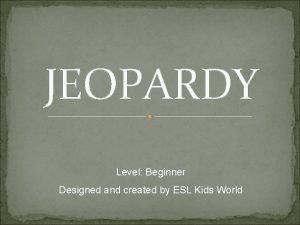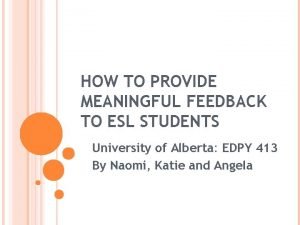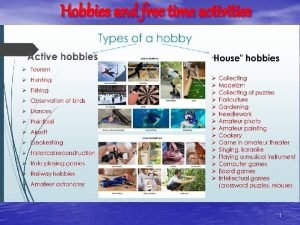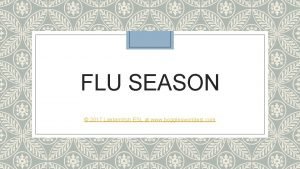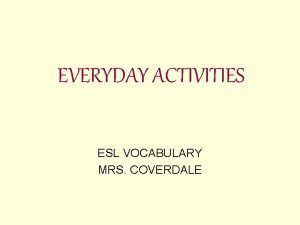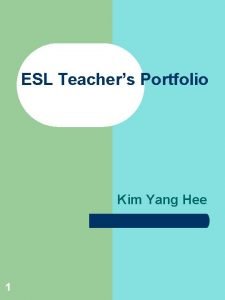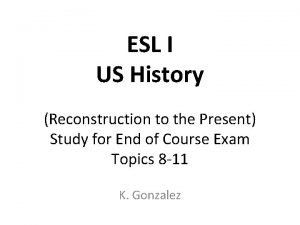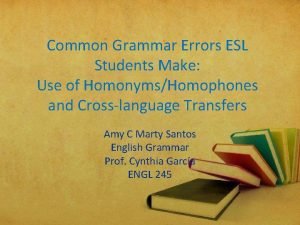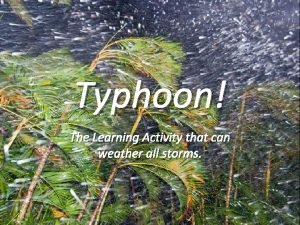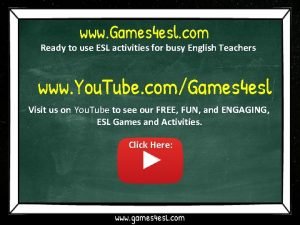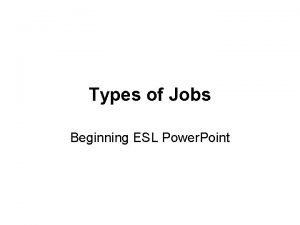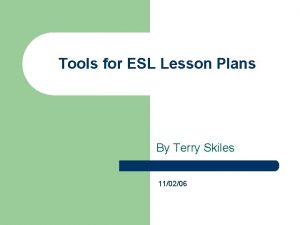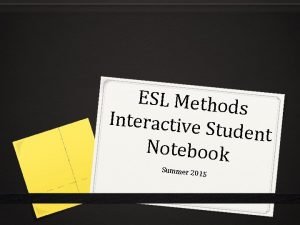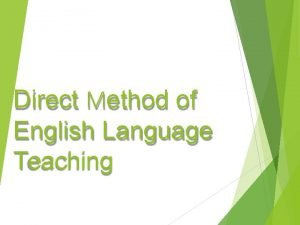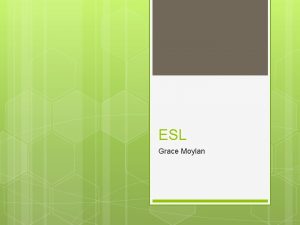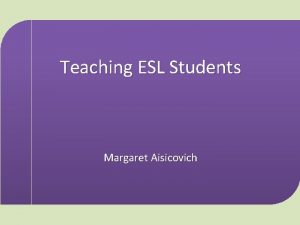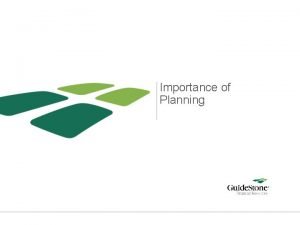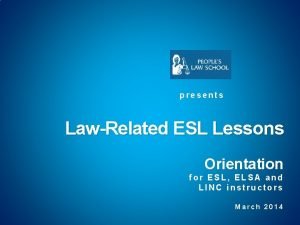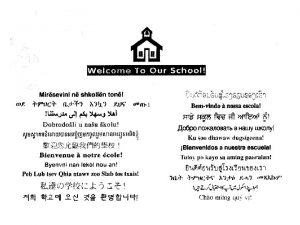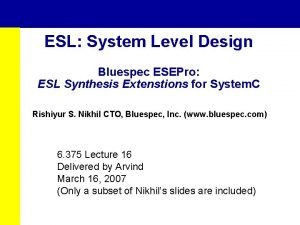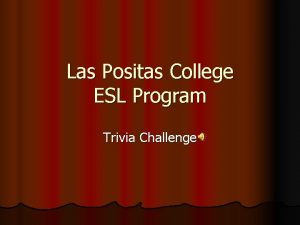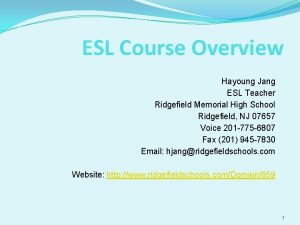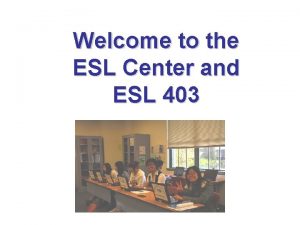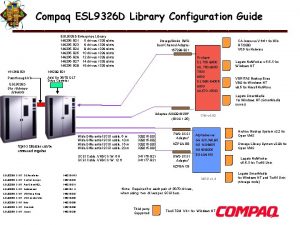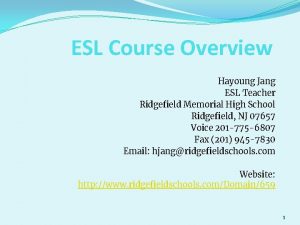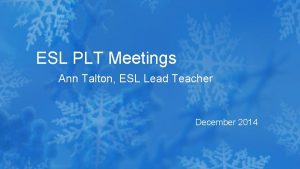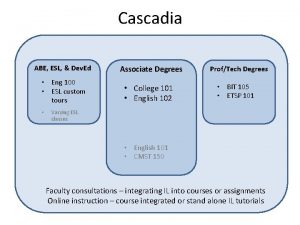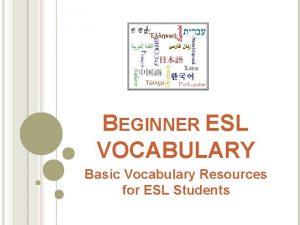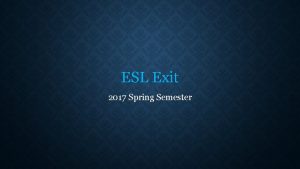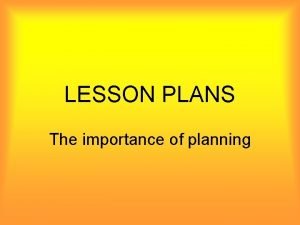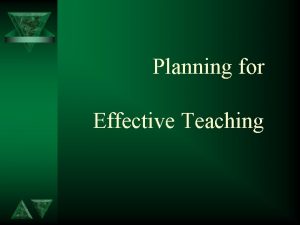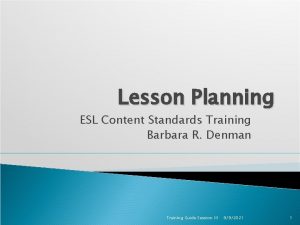Importance of Lesson planning in ESL Teaching 1

























- Slides: 25


Importance of Lesson planning in ESL Teaching 1. It gives a bird’s eye of view of things to be taught and learned everyday. 2. It makes you organized whilst teaching. 3. It provides the teacher many ways to keep the teaching process not monotonous and redundant. 4. It gives teacher a reality check of his everyday performance. 5. It definitely improves teaching skills.

Presentation Outline 1. Introduction 2. Purpose of a lesson plan 3. Major Elements of a lesson plan 4. Characteristics of a good lesson plan 5. Advantages of a lesson plan 6. 7. Writing lesson plans How to plan

Purpose of a lesson plan: To • • • structure the lesson organize its contents/materials determine method of its delivery assess students’ learning evaluate its application/effectiveness

MAJOR ELEMENTS • • Educational Objectives Content and Appropriate Teaching Activities Preparation of all the Material Monitoring & Assessing Learning

Characteristics of Good Lesson Plan Characteristics A Good Lesson Plan a. b. c. d. based upon previous knowledge. caters to the level of students. uses motivational techniques includes necessary materials

Characteristics e. is student centered, flexible, complete, interesting & activity based. f. has proportionate time allocation. g. includes evaluation process. h. includes all the essential elements of a lesson plan.

Advantages of a lesson plan • • • a key to the target. saves time. makes the work regular & organized. induces confidence. promotes learning. improves results.

Lesson Plan the Easy Way The clearer the structure of a lesson and the more precise the directions on what is to be accomplished, the higher the achievement rate.

FIVE LEVELS OF PLANNING 1. Daily planning … (Teacher) 2. Weekly planning… (Teachers-individually as well as in groups) 3. Unit planning … (Teachers’ Group /Co – ordination) 4. Term planning … 5. Yearly planning …

WRITING LESSON PLANS Components of a lesson plan: • • • Topic Resources Objectives Methodology Activity Homework

… EDUCATIONAL OBJECTIVES • Specify the new skills that the students will gain as a result of the lesson • Focus on student’s (not teacher’s) attainment • Determine the degree or criterion for satisfactory attainment of the objectives.

EDUCATIONAL OBJECTIVES ……. are the learning outcomes of a lesson i. e. what the students should be able to know or do at the end of the lesson that they could not do at the beginning!

… EDUCATIONAL OBJECTIVES Setting Objectives What will the learner be able to: • Know (concept…cognitive) • Do (skill… psychomotor) • Feel (behavior, attitude, appreciation or ideas…affective) Each defined objective is matched with: • Teaching Method • Learning Activities • Type of Assessment Note: Relevance is the essential quality of the educational objectives

Activity # 2 : EDUCATIONAL OBJECTIVES • • • Specific Measurable Attainable Realistic Time bound

ROLE OF LEARNING MATERIALS • • Defines Instructional Objectives Sets Tasks to Attain Objectives Informs Learners of Tasks they have to Perform Provides Guidance and Practice Provides Feedback on Retention of acquired Skills Makes the teaching effective. Supplies concrete basis for conceptual thinking. Makes learning permanent

Teaching Materials / Resources A. COURSE BOOKS B. SUPPLEMENTARY MATERIALS: 1. Teacher’s book 2. Work book

C. SUPPORTING MATERIAL: 1. Audio Materials 2. Visual materials 3. Audio-visual materials. 4. Multi media

Audio Visual Aids Supporting Materials TEACHERS PUPILS B/W BOARDS PICTURE FLASH CARDS ENVIRONMENT SMART BOARD FLASH MANUFACTURED VISUAL AIDS PICTURES WORD ADAPTABLE FLASH CARDS


METHOD Any teaching Item has three stages Presentation Practice Production

Method Presentation of the Items involves • Preparing class • make sure the concept is clear to the students • giving model example of the item • Practice the Teaching Item involves: • repetition/ drilling • discussion • Worksheets

…METHODS Production of the Teaching items: Involves: • Role play • Games / dialogue etc • Practicing the item • Assessment

WRITING LESSON PLANS Methodology - Specify Timings of each of these steps: (40/80 minutes) • Settling time • Introduction • Previous Knowledge • Presentation – Brainstorming / Discussion / teacher’s Input • Practice (Students output) – CW. Oral / Written • Home Work • Assessment – Test / worksheets

END
 Teaching multilevel esl classes
Teaching multilevel esl classes Solar system esl lesson plan
Solar system esl lesson plan Phases of micro teaching
Phases of micro teaching Meaning of teaching aids
Meaning of teaching aids Assure design model
Assure design model Berkeley extension esl
Berkeley extension esl Recast esl
Recast esl Whats this
Whats this Esl jeopardy
Esl jeopardy Feedback for esl students
Feedback for esl students Hobby conversation
Hobby conversation Lanternfish esl
Lanternfish esl Everyday activities vocabulary
Everyday activities vocabulary Teaching portfolio introduction
Teaching portfolio introduction Jeopardy gerunds and infinitives
Jeopardy gerunds and infinitives Esl american history
Esl american history Grammar problems for esl students
Grammar problems for esl students Typhoon esl game
Typhoon esl game Needs analysis esl
Needs analysis esl Questions about integrity
Questions about integrity 4esl games
4esl games Esl power systems jobs
Esl power systems jobs Calla esl
Calla esl Esl interactive notebook
Esl interactive notebook Direct approach in teaching
Direct approach in teaching Technology for the esl classroom
Technology for the esl classroom
